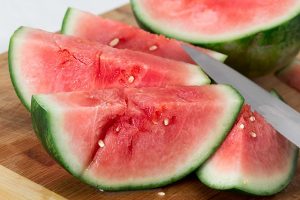This page contains affiliate links. We may earn money or products from the companies mentioned in this post through our independently chosen links, which earn us a commission. Learn More
 Yes. Dogs can eat watermelon, and it will not cause any allergies or stomach illness of any kind, but please be advised that there are some precautions to take. The dog should not be eating the seeds or the rind because they will cause health issues like intestinal blockage or gastrointestinal upset.
Yes. Dogs can eat watermelon, and it will not cause any allergies or stomach illness of any kind, but please be advised that there are some precautions to take. The dog should not be eating the seeds or the rind because they will cause health issues like intestinal blockage or gastrointestinal upset.
There are a few important things you should know about exactly how to feed your dog this juicy fruit. So read on to get clued up on how to nourish your pup.
Contents & Quick Navigation
Health benefits of watermelon
High water content
Watermelons contain 92% of water. So, while it must not be depended on as a sole source of hydration, giving watermelon to your dog as a tasty treat on a hot day will keep her hydrated and healthy.
High in vitamins
Watermelon is high in Vitamins A, B6 and C. These vitamins are all beneficial to your dog’s health. Vitamin A keeps your dog’s skin, hair and eyes healthy, and also helps growth and development in puppies. Vitamins B6 and C support the wellness of your dog’s immune system.
Low fat snack
To top it all off, watermelon is low in calories and has no fat or cholesterol. This makes it the ultimate healthy snack for your dog!
Can dogs eat watermelon rind?
No, dogs cannot eat watermelon rind. While for humans it is said to have health benefits, the rind of watermelon is very difficult for dogs to digest and can lead to gastrointestinal problems.
So be sure to give your dog only the fleshy part of this fruit.
Can dogs eat watermelon seeds?
Another no-no. Eating watermelon seeds can cause an intestinal blockage in dogs, so make sure that you remove the seeds before feeding your dog watermelon.
How much watermelon should I feed my dog?
As with any fruit that is safe for dogs to eat, you should give watermelon to your dog only in moderation. The reason for this is that dogs cannot digest fruits as well as we can, so large quantities can cause digestive upset and lead to diarrhea.
When introducing watermelon to your dog, start slowly. Begin with 1 or 2 small 1-inch wedges. This will give you a chance to see how your dog reacts to this fruit.
If your dog has no problems digesting it, you can gradually increase this amount. However, I wouldn’t advise giving your dog more than 4 or 5 1-inch wedges in one sitting.
When giving your dog fruit like watermelon, it should only be considered as a treat. She will still need her quality dog food in order to get her daily protein intake.
Can dogs eat all types of melon?
Other melons like cantaloupe and honeydew melon are also safe for your dog to eat, with the same precautions. Remove the rind and the seeds, and only feed it to your dog in moderation.
If your dog is getting on in years, cantaloupe can be particularly beneficial, as it is high in anti-inflammatory properties, which can help to ease swollen or arthritic joints in older dogs.
What about seedless watermelons?
Yes, there is such a thing as a seedless watermelon; a hybrid whose seeds do not mature into hard, black ones.
It is worth me mentioning here that while seedless watermelons might sound like an easier option, this variety of watermelon still comes with the hollow, white shells of the seeds.
Although these are less likely to cause your dog intestinal problems, I highly recommend removing them.
How to prepare your dog a refreshing, healthy treat with watermelon
On a hot, summer’s day, this fruit can be made even more refreshing by making it into a frozen snack.
This video shows you how to prepare a simple watermelon treat to keep your dog cool and hydrated on a hot day.
Conclusion
Watermelon is hydrating and full of vitamins that are good for your dog’s health. You can give it to your dog, but remember:
- Remove the rind
- Remove the seeds
- Start with a small amount
- Feed it to your dog in moderation
Does your dog like watermelon? What other fruits do you share with her? Leave a comment below and let me know!

Leave a Reply